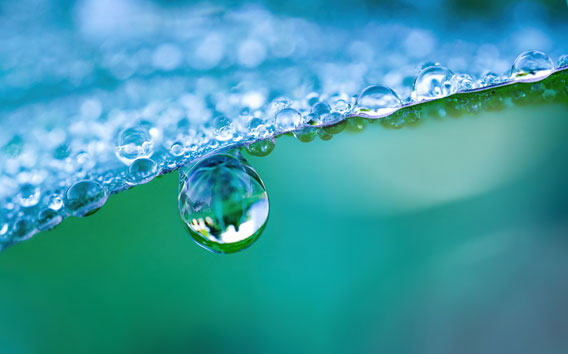
Impact Initiative: Driving environmental sustainability
This Impact Initiative is our holistic approach that combines all of Grünenthal’s environmental initiatives with our suppliers’ production activities and the full life cycle of our products.

We join together with our employees, partners and customers to reduce our carbon footprint, save energy and resources, and decrease waste in our value chain.
In close dialogue with our stakeholders, we have identified three major areas of action where we can create a meaningful impact and achieve our goals for protecting the environment: Our Environmental Excellence Strategy, the Responsible Use of Resources and Our Impact on Climate.
Our goal is to further promote environmental sustainability. To manage this, we are continually working on our Environmental Excellence Strategy, which is based on our Impact Initiative: Planet – Driving environmental sustainability.
| Our sustainability ambitions |
| Based on the defined environmental strategy, Grünenthal is in the process of implementing the environmental initiatives according to its established roadmap to further develop the complete scope of Grünenthal's operations, supplier production and patient/after-use value chain of our products. |
Our Environmental Performance and Data Integrity Standard emphasises the importance of managing and reporting requirements for all sustainability-related data. Our Environmental Impact Assessment Standard sets internal requirements for environmental and social impact assessment studies for new construction projects.
In December 2022, Grünenthal’s research labs at the company’s headquarter in Aachen received My Green Lab® certifications. My Green Lab is a non-profit organisation that is considered to be the gold standard for sustainable laboratory practices worldwide.
Discover more: Green Labs – committed to Science & SustainabilityResponsible use of resources is essential for us and our stakeholders because it limits our impact on the environment. In particular, we focus on our energy and water consumption, as well as the handling of production waste.
| Our sustainability ambitions |
| Annual reduction of 3% in normalized waste (tonnes/produced units or volume per site) |
| Annual reduction of 2% in water consumption (m3/produced units or volume per site) |
Reducing our impact on the environment by improving the way we use energy
Globally, energy consumption is the dominant contributor to climate change. To minimise our emissions, we collect and regularly analyse data from our production sites so that we can continuously improve resource efficiency and reduce our energy consumption.
reduction of energy consumption in 2022.
Our production site in Mitlödi, Switzerland, is powered by 100 percent renewable energy from a local hydropower plant. Built underground, the state-of-the-art facility generates and stores renewable energy by pumping water from Lake Limmern to Lake Muttsee. As a next step, we are exploring the possibility of installing a heat pump powered by green electricity. This would enable us to meet our heating needs while cutting our use of natural gas.
Discover more: Grünenthal’s site in Mitlödi is powered by green electricityBy swapping thousands of traditional incandescent light bulbs for LED bulbs at our sites, we are cutting our annual energy use and reducing emissions. At our headquarters in Aachen, Germany, for example, this will save approximately 205,000 kilowatt-hours a year. Many of our manufacturing sites are now lit with LED bulbs, and we will continue until we have replaced 100 percent of the traditional bulbs across our business.
Discover more: LED bulbs as a shining exampleManaging water and waste
Not only does water consumption play a decisive role in our daily operations, but also the reduction and safe handling of wastewater and solid waste.
recycling rate for the solvent tetrahydrofuran at our site in Switzerland.
Overall, water consumption at Grünenthal was reduced by 8 % in 2022 compared with the previous year.
Our global wastewater standard sets out guidance for the management of wastewater as well as requirements of sampling and reporting wastewater quality against local requirements. At our production site in Switzerland we achieve wastewater purity that is significantly better than official limits.
In 2020, we set ourselves the ambitious goal of sending zero waste from our manufacturing facilities to landfill. Just one year later, we achieved that goal. By separating waste in the production area, raising awareness and exploring new ideas, we now reduce, reuse and recycle more waste. The remaining waste that cannot be efficiently recycled is sent for incineration.
Discover more: Grünenthal’s manufacturing sites now send zero waste to landfillWe want to better understand our impact on climate change and take action to reduce it. We measure our corporate carbon footprint and set specific targets for reducing future CO2 emissions.
A sustainable future can only become reality when we work together. With over 6,000 companies taking action, the Science Based Target initiative (SBTi) provides such a framework. To advance our sustainability goals, we are updating our ambitions this November 2023 to ensure they are aligned with this initiative.
| Our sustainability ambition |
SBTi targets:
|
reduction in Scope 2 CO2e emissions (indirect emissions from acquired energy) in 2022.
Our Aachen R&D and production site will soon feature the region's largest solar power plant. With over 4,000 solar panels, we will generate enough energy to power 500 households. Our goal is to reach net zero emissions by 2030, and this solar power plant will play a key role in reducing up to 366 tonnes of CO2 annually.
Learn more about our initiatives to reduce our environmental footprint in our german press releaseWe launched our #TreesForOurPlanet reforestation initiative worldwide in 2021. During the first year, our teams planted more than 10,000 trees worldwide – far exceeding our target of 7,500. In 2022, Grünenthal employees planted more than 11,000 new trees and in 2023, more than 8,000. This initiative now aims to plant at least 30,000 trees by 2026. We have almost reached it. But there is more to come. Although trees absorb carbon dioxide, helping with the defence against climate change, planting these trees is not calculated as a carbon offsetting project for Grünenthal.
Discover more: "Trees For Our Planet" project in 2022M-N/A-DE-08-23-0003